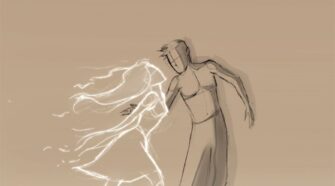希言自然,故飄風不終朝,驟雨不終日。
孰為此者?天地。
天地尚不能久,而況於人乎?
故從事於道者,道者,同於道;德者,同於德;失者,同於失。
同於道者,道亦樂得之;同於德者,德亦樂得之;同於失者,失亦樂得之。
信不足,焉有不信焉。
Nature says few words:
Hence a windstorm lasts not a whole morning.
A rainstorm continues not a whole day.
Where do they come from?
From Nature.
Even Nature does not last long (in its utterances),
How much less should human beings?
Therefore it is that:
He who follows the Tao is identified with the Tao.
He who follows Character (Te) is identified with Character.
He who abandons (Tao) is identified with abandonment (of Tao).
He who identifies with the Tao –
The Tao is also glad to welcome him.
He who identifies with character –
Character (Te) is also glad to welcome him.
He who identifies with abandonment –
Abandonment is also glad to welcome him.
He who does not have enough faith –
Will not be able to command faith from others.
(Translated by Yu Tang Lin)

Tao Te Ching consists of two sections: Chapter one to thirty-seven is all about Tao, whereas the second section about Te is from chapter thirty to eighty-one. Tao is the “body, ” and Te is the “application.”
Lao Tzu admired nature, and he believed Tao is nature. Nature is of few words, and laws and regulations are against nature. Hence they will not last long. It is inevitable that things that are not natural will not persist. Only things which are natural can be sustained.
Here he gives the examples of a windstorm and a rainstorm, which only last for a short time. But the gentle breeze and bright sun will last long. If heaven and earth go against nature, they will not persist, and the same applies to humans. If people violate nature, they will not last long, so people should follow and abide by nature.
Lao Tzu mentioned there are three types of people:
1. Those who follow the Tao and identify with Tao.
2. Those who follow the Te and identify with Te.
3. Those who neither follow Tao nor follow Te and identify with loss.
The last two lines: “He who has not enough faith will not be able to command faith from others,” has been used to describe rulers in chapter 17. They do not integrate well with this section, so we can just remove these sentences.



